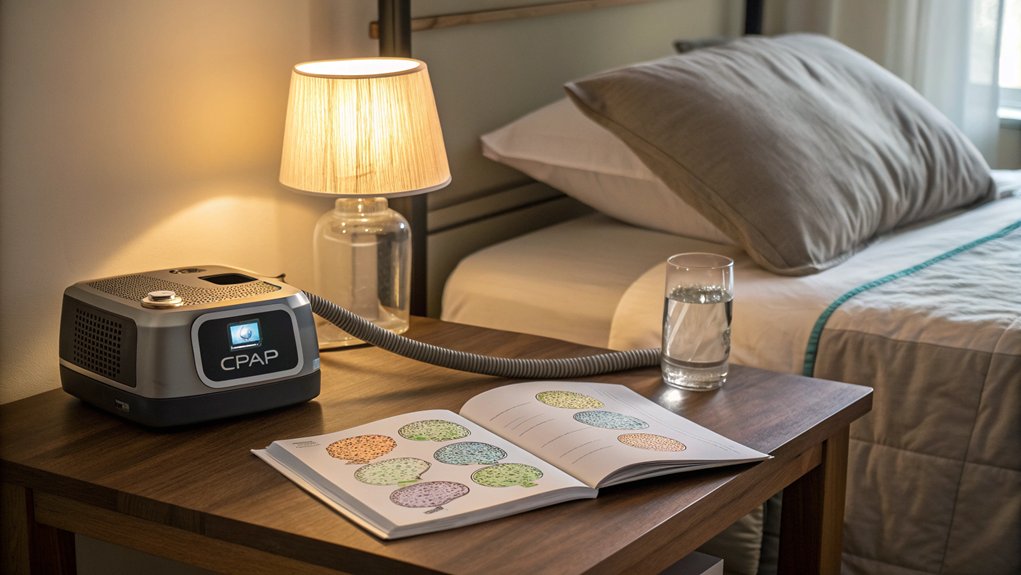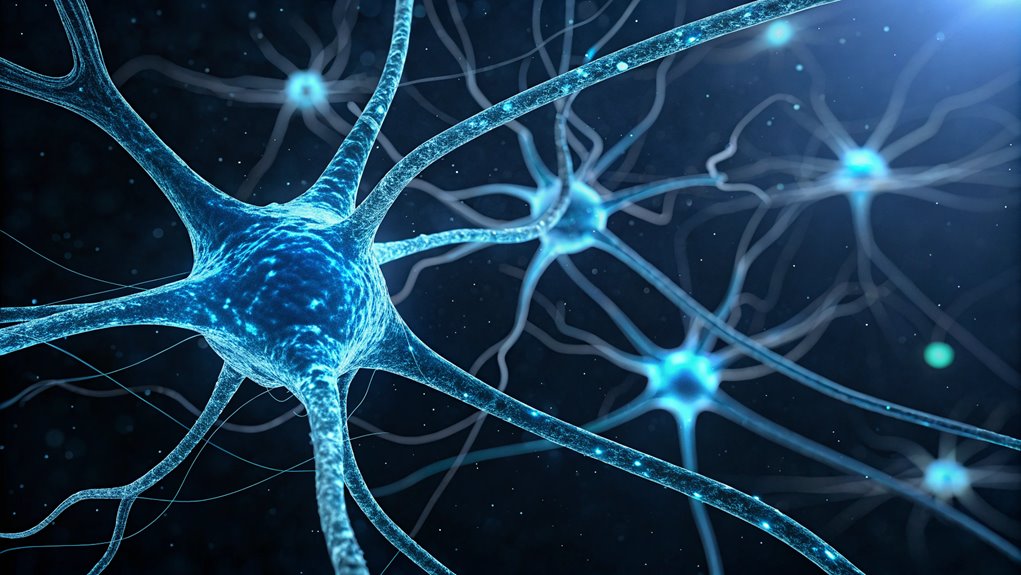Strategies to Combat Sleep Apnea and Memory Loss Together

Prefer listening? Check out the podcast version of this article.
Many people don’t realize that untreated sleep apnea can significantly impact memory and cognitive function.
Addressing this issue involves more than just improving your sleep quality; it requires a strategic approach to enhance brain health.

Utilizing CPAP therapy or custom oral devices can provide immediate relief, but integrating cognitive exercises and lifestyle changes is essential for long-term success.
Discover how these combined strategies can transform both your sleep and memory health.
Table of Contents
The Brain-Sleep Connection Impact
You mightn’t realize how much sleep disruptions can harm your memory.
When sleep apnea interrupts your breathing, it deprives your brain of oxygen, which can damage brain matter over time.
Additionally, these disruptions prevent your brain from properly processing and consolidating memories during crucial sleep cycles.
How Sleep Disruption Damages Memory
When sleep is disrupted by conditions like sleep apnea, the brain’s ability to consolidate memories is significantly impaired.
You experience memory consolidation disruption, which leads to cognitive deterioration.
REM sleep deprivation, commonly seen in sleep apnea, further exacerbates memory encoding deficits.
This stage of sleep is crucial for processing information and solidifying new memories.
Discover Your Path to a Longer, Healthier Life!
Take our free quiz to see how your lifestyle measures up to the world's longest-living communities and receive expert tips for a healthier, longer life.
Take the QuizWithout it, you might struggle with concentration challenges, impacting daily activities.
Brain oxygenation issues arise from the repeated breathing interruptions, further hindering memory function.
The lack of oxygen interrupts normal brain processes, making it difficult for you to retain and recall information.
Addressing sleep apnea effectively is vital to mitigate these memory-related issues and enhance your overall cognitive health.

Your proactive approach can make a significant difference.
Oxygen Deprivation Effects on Brain Matter
Although frequently overlooked, oxygen deprivation due to sleep apnea profoundly impacts brain matter, underscoring the critical brain-sleep connection.
When your brain experiences oxygen depletion, it can lead to hypoxia-induced damage.

This condition disrupts cellular metabolism, which plays a crucial role in maintaining brain function.
Blood flow reduction further complicates the scenario, affecting nerve tissue and leading to myelination impairment.
Myelin, the protective sheath around nerve fibers, becomes compromised, slowing down signal transmission in the brain.
These changes can interfere with cognitive processes, resulting in noticeable memory and concentration issues.
Addressing sleep apnea is essential for mitigating these effects and preserving your brain’s health, ensuring that oxygen levels remain stable to support optimal brain function and prevent further damage.
Memory Processing During Sleep Cycles
Understanding how memory processes during sleep cycles reveals the intricate brain-sleep connection that’s pivotal in addressing sleep apnea and its cognitive effects.
You rely on sleep to facilitate the memory consolidation process, crucially involving cerebral oxygenation patterns and hippocampal activity levels.
Sleep apnea disrupts these processes, particularly through REM sleep deprivation and slow wave sleep disruption, which can impair memory and cognitive function.
Your circadian rhythm’s importance can’t be overstated, as it regulates these sleep cycles, ensuring proper memory processing.
When sleep apnea alters oxygen levels, it affects your brain’s ability to consolidate memories, leading to cognitive difficulties.

Addressing these disruptions through effective treatment strategies helps restore both sleep quality and cognitive health, highlighting the need for comprehensive management of sleep apnea.
Treatment Solutions for Better Sleep and Memory
To effectively address sleep apnea and its cognitive impacts, consider integrating several treatment strategies.
CPAP therapy can significantly enhance brain function by ensuring continuous airflow during sleep, while custom oral devices like mandibular advancement appliances offer tailored solutions to maintain airway patency.
Additionally, adopting daily habits such as regular exercise, a balanced diet, and avoiding alcohol and tobacco can further support optimal sleep quality and memory preservation.
CPAP Benefits for Brain Function
CPAP therapy offers significant benefits for brain function, serving as a crucial treatment solution for improving sleep and memory in individuals with sleep apnea.
By emphasizing CPAP compliance importance, you enhance nocturnal oxygenation, which is vital for brain health.
This improvement allows for effective brain activity monitoring and promotes neural repair stimulation, crucial for cognitive rehabilitation strategies.
Consistent CPAP use optimizes sleep quality, reducing disruptions that can impair memory consolidation processes.
Patients often report noticeable cognitive improvements, affirming the therapy’s role in managing sleep apnea’s cognitive impacts.
Studies highlight that adherence to CPAP can lead to better memory performance and overall cognitive function.
Thus, integrating CPAP therapy into your treatment plan is essential for preserving and enhancing brain function.
Custom Oral Devices That Help
While CPAP therapy is a well-established treatment for sleep apnea, custom oral devices offer an alternative solution for improving sleep and memory.
Dental mouth guards, such as customized oral appliances, work by keeping your airway open, thereby reducing apnea episodes.
Mandibular positioning devices and mandibular advancement splints reposition your lower jaw forward, which helps prevent airway obstruction.
Tongue retaining devices function by holding your tongue in place to avoid airway collapse.
These oral sleep devices are tailored to your specific needs, ensuring comfort and efficacy.
Clinical evidence suggests that they can significantly improve sleep quality and, consequently, cognitive function.
By choosing a custom oral device, you may find an effective method to address both sleep apnea and its impact on memory.
Daily Habits That Make a Difference
Incorporating specific daily habits can significantly enhance both sleep quality and memory function for those dealing with sleep apnea.
First, establish consistent sleep schedules to regulate your body’s internal clock.
Engage in cognitive strengthening activities, like puzzles or memory exercises, to boost brain health.
Consider dietary changes—consume foods rich in omega-3 fatty acids and antioxidants to support cognitive function.
Social engagement also plays a vital role; maintaining social connections can improve mental agility.
Implement stress management techniques such as mindfulness or yoga to reduce anxiety and improve sleep quality.
Finally, focus on environmental sleep optimizations: ensure your bedroom is dark, quiet, and cool, and limit screen time before bed.
These strategies collectively support both sleep and cognitive health.
Memory Protection Through Sleep Management
As you work to protect your memory through sleep management, it’s important to recognize early warning signs of sleep apnea, such as excessive daytime sleepiness and loud snoring.
Engaging in brain exercise activities, like puzzles and memory games, can help strengthen cognitive function.
Additionally, adopting sleep quality improvement steps, such as establishing a consistent bedtime routine and creating a restful environment, supports both memory retention and overall brain health.
Early Warning Signs to Watch
Identifying early warning signs of sleep apnea can be crucial in protecting your memory and cognitive health.
You should consider early detection screening and sleep study evaluations if you notice any changes in your cognitive abilities or daytime functioning.
Monitoring overnight oxygen levels is essential, as these fluctuations can impact brain health.
Be vigilant for:
- Lifestyle impact factors: Weight gain, smoking, or alcohol use can exacerbate symptoms.
- Daytime functioning changes: Increased drowsiness or difficulty concentrating.
- Cognitive assessment tools: Utilize them to track memory and thinking skills.
Recognizing these signs allows for timely intervention, reducing the risk of memory loss.
Understanding how these factors interplay will help you address the root of the problem, offering a path to improved sleep and cognitive health.
Brain Exercise Activities
Engaging in targeted brain exercises can significantly bolster cognitive health, particularly for individuals managing sleep apnea.
You can incorporate brain stimulating exercises that specifically challenge your cognitive abilities.
Consider activities like puzzles, crosswords, and Sudoku as effective cognitive challenge activities.
These tasks not only enhance mental alertness but also serve as memory boosting workouts.
Regularly engaging in focus enhancing tasks, such as meditation or mindfulness practices, can improve your concentration and attention span.
Additionally, recollection strengthening hobbies, like learning a new language or musical instrument, can provide a robust workout for your brain.
Such mental alertness practices can play a crucial role in maintaining cognitive health, helping to mitigate the cognitive decline often associated with sleep apnea.
Sleep Quality Improvement Steps
Enhancing sleep quality is crucial to protecting memory and cognitive function in individuals dealing with sleep apnea.
You can improve your sleep by integrating effective strategies into your daily routine.
Consider the following patient-focused sleep quality improvement steps:
- Wind down routines: Establish calming activities before bed, such as reading or meditation, to signal your body it’s time to sleep.
- Light exposure habits: Regulate your exposure to natural light during the day and limit artificial light at night to support your circadian rhythm.
- Mindful sleep practices: Incorporate relaxation techniques like deep breathing or gentle yoga to ease into bedtime relaxation.
Additionally, maintaining good sleep hygiene tips, optimizing napping strategies, and creating a supportive sleep environment can further enhance restorative sleep, aiding in memory protection.
Sleep and Memory Recovery Path
To effectively combat sleep apnea-related memory issues, focus on establishing a clear timeline for cognitive improvement through consistent treatment adherence.
Building daily recovery routines, such as regular exercise and mental activities, can significantly enhance your memory restoration journey.
Prioritizing these strategies will support long-term brain health maintenance and improve overall quality of life.
Timeline for Cognitive Improvement
While embarking on the journey to improve cognitive health affected by sleep apnea, understanding the timeline for recovery can provide a roadmap for progress.
Tracking your sleep quality and adhering to treatment plans are essential steps.
Memory recovery timeline: Improvements in memory can begin within weeks of consistent treatment, but full recovery may take several months.
Treatment adherence impact: Staying committed to interventions like CPAP therapy significantly influences cognitive recovery.
Regular use is key.
Long term follow up outcomes: Continuous monitoring and follow-ups ensure sustained cognitive health and detect any relapse early.
Building Daily Recovery Routines
Monitoring sleep quality and adhering to treatment plans lay the groundwork for cognitive recovery, yet establishing daily routines plays a vital role in enhancing sleep and memory recovery.
Start by implementing a consistent daytime exercise regime, which can improve sleep quality and boost cognitive function.
Dietary adjustments, such as balanced meals, support brain health and stabilize energy levels.
Prioritize hydration habits throughout the day to ensure optimal cognitive performance.
Lifespan Comparison Tool
Compare the life expectancy by the U.S. State
Incorporate evening meditation and relaxation techniques to reduce stress and promote restful sleep.
Establish a tech-free bedtime routine to minimize blue light exposure, which can interfere with sleep patterns.
Long-term Brain Health Maintenance
Maintaining long-term brain health requires a proactive approach that focuses on both sleep and memory recovery.
By integrating cognitive reserve strategies with restorative sleep mechanics, you can enhance your cognitive resilience.
Optimizing your circadian rhythm plays a crucial role in this process, ensuring your sleep is both restorative and beneficial for memory retention.
Consider these evidence-based strategies:
- Wearable sleep tracking: Monitor sleep patterns to identify disruptions and improve sleep quality.
- Metabolic health impacts: Maintain a healthy diet and exercise regimen to support brain function and reduce cognitive decline.
- Emotional regulation benefits: Practice stress-reduction techniques to enhance mental clarity and memory.
Together, these approaches foster a robust pathway to preserving cognitive function, ensuring you maintain brain health in the long term.
Conclusion
By addressing sleep apnea, you’re not just chasing better sleep; you’re investing in sharper memory and cognitive health.
Think of it as the domino effect: when your sleep improves, so does your memory.
Embrace CPAP therapy, cognitive exercises, and a consistent sleep routine to unlock this potential.
Like a well-tuned orchestra, these strategies work in harmony to enhance your brain function.
Stay committed, and you’ll find the symphony of restful nights and improved memory truly rewarding.

 972-393-1699
972-393-1699





